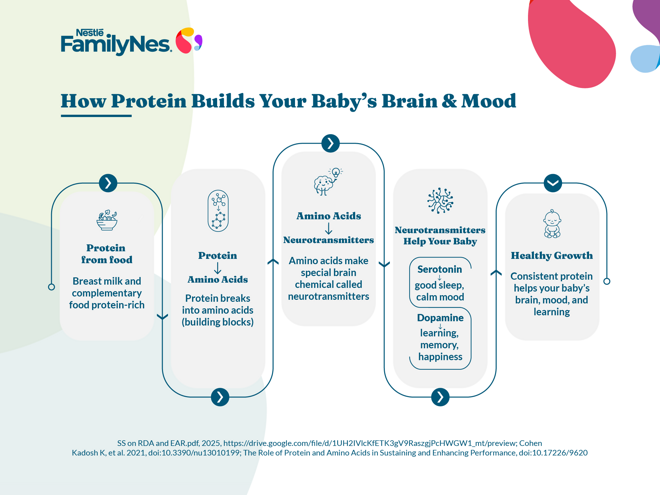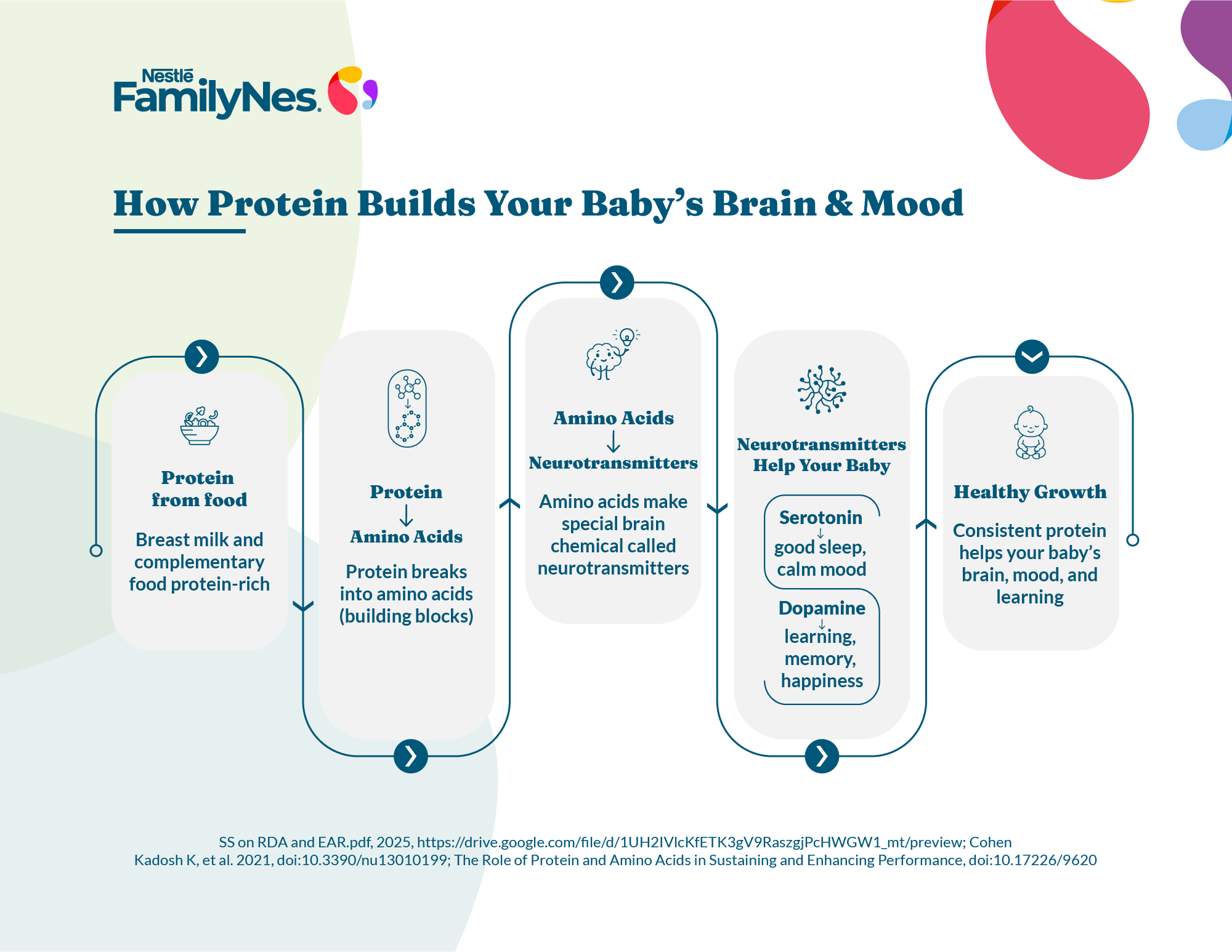
How Protein Supports Your Baby’s Brain Development?
Your baby’s brain grows the fastest in the first few years of life. Their brain grows faster in the first year than at any other time. While love and care matter, nutrition is the one factor you can directly control, and protein is at the heart of it. Providing the right amount of protein supports healthy brain growth, but if overlooked, it can increase the risk of learning and developmental problems later on1.
What role does protein play in brain development?
Protein is like a building block for your baby’s brain in the first year of life. It helps brain cells grow, make strong connections, and support key functions like memory, learning, and mood.
The first 12 months, especially the first 4 months, are very important because your baby’s brain is growing at its fastest pace. If a baby doesn’t get enough protein, the brain may not grow to its full potential, which can affect thinking and learning later in life.
Providing protein-rich foods (through breastmilk and complementary foods, after 6 months) like pulses, dals, milk, curd, eggs, or fish helps ensure your baby’s healthy brain development2. But it is not just about giving protein; it is about giving it every day.
Why is consistent protein intake important?
Protein gives your baby special parts called amino acids, which are needed to make “messenger chemicals” in the brain called neurotransmitters. These chemicals help the brain control learning, memory, and mood.
Your baby needs a steady supply every day to fuel growth and brain development. 3 4
How exactly does protein shape your baby’s thoughts, mood and learning?5
The answer lies in tiny brain messengers called neurotransmitters. In the first year of life, your baby’s brain uses special chemicals called neurotransmitters to send messages between brain cells. Think of protein as the raw material your baby’s brain uses to make ‘happy and learning chemicals’ like serotonin and dopamine.
- Serotonin helps with mood, sleep, and feeling calm. It also plays a role in brain development and emotional balance.
- Dopamine supports learning, memory, movement, and the feeling of joy or reward when your baby explores and interacts with the world.
That’s why steady protein intake in the first 12 months is important, as it fuels not just physical growth, but also emotional and cognitive development.

How much protein does your baby need?
The recommended protein intake for infants is3:
- 0–6 months: about 8 g per day (met mainly through breastmilk).
- 6–12 months: about 10.5 g per day, as babies start complementary foods along with breastmilk.
What is the bottom line on protein and brain development?
The first year of life is a golden window for brain growth. Protein is more than just a nutrient for strong muscles; it powers brain development by building cells and creating neurotransmitters that shape mood, sleep, and learning. By ensuring steady protein every day, through breastmilk first and later with simple protein-rich foods, you’re giving your baby the best start: a strong body, a sharp mind, and a happy heart.
This content is not a substitute for professional medical advice. Please consult your healthcare professional.
Disclaimer: Mothers are informed that breast milk, especially the yellowish colostrum secreted in the first week after delivery, is highly nutritious and contains more protein, anti-infective properties, and Vitamin A. Breast milk is a complete food for the first six months, protects against infections, is always available, and requires no preparation. It is also more economical than infant milk substitutes.
Breastfeeding immediately after delivery helps the womb contract and supports the mother in regaining her figure quickly. Frequent suckling and maternal confidence are key to success. Mothers should be encouraged and supported, with proper care of breasts during pregnancy. Infants should be breastfed as soon as possible after birth, and mother and child should stay together (rooming-in). Colostrum must be given and not discarded in favor of sugar water or other substitutes. Infants should be fed on demand, and hygiene for both mother and child must be maintained.
References
- Georgieff MK, Ramel SE, Cusick SE. Nutritional influences on brain development. Acta Paediatrica. 2018;107(8):1310-1321. doi:10.1111/apa.14287
- Cusick SE, Georgieff MK. The Role of Nutrition in Brain Development: The Golden Opportunity of the “First 1000 Days.” The Journal of Pediatrics. 2016;175:16-21. doi:10.1016/j.jpeds.2016.05.013
- SS on RDA and EAR.pdf. Google Docs. Accessed August 18, 2025. https://drive.google.com/file/d/1UH2IVlcKfETK3gV9RaszgjPcHWGW1_mt/previ…
- Cohen Kadosh K, Muhardi L, Parikh P, et al. Nutritional Support of Neurodevelopment and Cognitive Function in Infants and Young Children—An Update and Novel Insights. Nutrients. 2021;13(1):199. doi:10.3390/nu13010199
- The Role of Protein and Amino Acids in Sustaining and Enhancing Performance. National Academies Press; 1999:9620. doi:10.17226/9620


